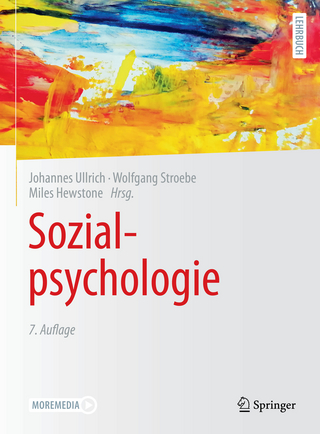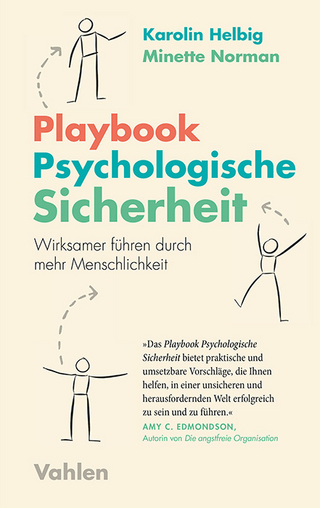
Organization Change
SAGE Publications Inc (Verlag)
978-1-5063-8649-2 (ISBN)
- Titel erscheint in neuer Auflage
- Artikel merken
Organization Change: Theory and Practice provides a range of theories, models and perspectives, helping leaders, managers and employees to understand both how to implement planned change, and how to handle unexpected change.
The Fifth edition contains the latest research in the field of Organizational change, seven new case studies on effective and ineffective change, and an examination of the evolutionary and revolutionary nature of change. Organization change in not-for-profit organizations is also addressed with a brand new chapter on healthcare and government organizations.
The book is complimented by a companion website featuring a range of tools and resources for instructors, including a Microsoft Word® test bank, chapter-specific PowerPoint slides, Sample course syllabi, video and multimedia resources and access to full-text SAGE journal articles.
Suitable reading for undergraduate and postgraduate students.
Originally educated as a social-organizational psychologist (Ph.D., University of TexaAustin), Dr. Burke is currently engaged in teaching, research, and consulting. He teaches leadership, organizational dynamics and theory, and organization change and consultation. His research focuses on multirater feedback, leadership, learning agility, and organization change. Dr. Burke′s consulting experience has been with a variety of organizations in business-industry, education, government, religious, medical systems, and professional services firms, including British Airways, SmithKline Beecham, National Westminster Bancorp, British Broadcasting Corporation, Business Consultants, Inc. of Japan (since 1972); Pricewaterhouse Coopers Consulting, the National Aeronautics and Space Administration, Dime Savings Bank, and Miller and Chevalier law firm. He formerly served as senior advisor to the strategy and organization change practice of IBM Global Business Services. Prior to his move to Teachers College, Dr. Burke was professor of management and chair of the Department of Management at Clark University. Prior to the Clark assignment, Dr. Burke was an independent consultant from 1974 to 1976. For eight years he was a full-time professional with the NTL Institute for Applied Behavioral Science, where he was director for Executive Programs and director of the Center for Systems Development (1966-1974). For eight years beginning in 1967 he also served as the executive director of the Organization Development Network Dr. Burke is a Fellow of the Academy of Management, the Association for Psychological Science, and the Society for Industrial and Organizational Psychology. He has served on the Board of Governors of the Academy of Management and the American Society for Training and Development, and he is a Diplomate in organizational and business consulting psychology, American Board of Professional Psychology. From 1979 to 1985 he was editor of Organizational Dynamics, and from 1986 to 1989 he started and served as editor of the Academy of Management Executive. Dr. Burke is the author of more than 150 articles and book chapters on organization development, training, change and organizational psychology, and conference planning; and author, co-author, editor, and co-editor of 19 books. His latest book published by Sage is Organization Change: Theory and Practice, 4th Ed. He designed and served as faculty director of the Columbia Business School executive program "Leading and Managing People" from 1988 to 1995. In 1989 he received the Public Service Medal from the National Aeronautics and Space Administration, in 1990 the Distinguished Contribution to Human Resource Development Award and in 1993 the Organization Development Professional Practice Area Award for Excellence - The Lippitt Memorial Award - from the American Society for Training and Development. Dr. Burke has also served on three committees for the National Research Council of the National Academy of Sciences (1994-2012). August of 2003 he received the Distinguished Scholar-Practitioner Award from the Academy of Management, and in October of 2003, he was the recipient of the Organization Development Network’s Lifetime Achievement Award. In 2004 he was appointed Distinguished Scholar-in-Residence for the Management Consulting Division of the Academy of Management, and in 2005 and 2010 he received the Linkage Corporation’s Lifetime Achievement Award for leadership in the field of organization development. Also in 2005, he became the co-director of the Eisenhower Leadership Development Program, an MA in organizational psychology joint program between Teachers College and the United States Military Academy at West Point. Also in collaboration with the U.S. Army War College, Dr. Burke is responsible for a one-year fellowship program for U.S. Army Colonels. In April, 2007, he received the Distinguised Lifetime Contribution to Practice Award from the Society for Industrial and Organizational Psychology, and in 2011 the Lifetime Achievement Award from the Best Practice Institute. His most recent book is the 3rd edition of Organization Development: A Process of Learning and Changing (2015; Pearson Education) now co-authored with Debra Noumair. On May 19, 2016, Dr.Burke was given The Outstanding Civilian Service Medal Award from the Department of the Army for his work with the United States Military Academy at West Point.
Chapter 1: Sources for Understanding Organization Change
Introduction and Overview
A Short Story of Launching Organization Change
Chapter 2: Rethinking Organization Change
The Paradox of Planned Organization Change
Making the Case for Organization Change
Personal Declarations and Points of View
A Closing Request
Chapter 3. A Brief History of Organization Change
Scientific Management
The Hawthorne Studies
Industrial Psychology
Survey Feedback
Sensitivity Training
Sociotechnical Systems
Organization Development
The Managerial Grid and Organization Development
Coercion and Confrontation
Management Consulting
Chapter 4: Theoretical Foundations of Organizations and Organization Change
Open-System Theory
Characteristics of Open Systems
Organization Change Is Systemic
Toward a Deeper Understanding of Organization Change
Capra’s Three Criteria for Understanding Life
Implications for Organizations and Organization Change
Chapter 5: The Nature of Organization Change
Revolutionary Change
Evolutionary Change
Revolutionary Change: Case Example
Evolutionary Change: Case Example
Chapter 6: Levels of Organization Change: Individual, Group, and Larger System
Change in Organizations at the Individual Level
Individual Responses to Organization Change
Change in Organizations at the Group Level
Group Responses to Organization Change
Change in Organizations at the Larger-System Level
System Responses to Organization Change
Chapter 7: Organization Change: Research and Theory
Reviews of Organization Change Research
Recent Approaches to Research and Theory
Organization Models
Organization Change Theory
Current Thinking on Organization Change and Research
Chapter 8: Conceptual Models for Understanding Organization Change
Content: What to Change
Process: How to Change—A Theoretical Framework
Process: How to Change—Practice Frameworks
Mini-Theories Related to Organization Change
The Content and Process of Strategic Change in Organizations
Strategies for Effecting Change in Human Systems
Chapter 9: Integrated Models for Understanding Organizations and for Leading and Managing Change
What Is an Organizational Model?
Why Use an Organizational Model?
Organizational Models and Organization Change
A Comparison of the Three Models
Chapter 10: The Burke–Litwin Causal Model of Organization Performance and Change
Background
The Model
Support for the Model’s Validity
Chapter 11: Organizational Culture Change
Experiencing Organizational Culture
The British Airways Story: A Case of Culture Change
You Don’t Change Culture by Trying to Change the Culture
A Theoretical Summary of the British Airways Story
Chapter 12: Understanding and Working With Loosely Coupled Systems
The Case of Change at the A. K. Rice Institute
Organizational Structure and Loosely Coupled Systems
Loosely Coupled Systems
Chapter 13: Those Other Organizations
Chapter 14: Transformational Leadership
Does Leadership Matter?
On Defining Leadership
Toward Further Definition
Characteristics of Executive Leadership
Howard Gardner’s Leading Minds
Howard Gardner’s Changing Minds
Chapter 15: Leading Organization Change
Phases of Organization Change and the Leader’s Role
The Prelaunch Phase
The Launch Phase
Postlaunch: Further Implementation
Sustaining the Change
Chapter 16: Organization Change: Summary and Integration
Applying The Tipping Point Principles to Planned Organization Change
Changing the Organization
Successful Processes of Organization Change
Positive Organization Change
The Look of Change
Chapter 17: Organization Change: What We Need to Know
The Process of Organization Change
Organization Change Leadership
Organizational Structure
Formal and Informal Rewards
Training and Development
Teams and Teamwork in Organizations
Organizational Size
Organizational Performance
Learning Priorities Moving Forward
Conclusion
| Erscheinungsdatum | 23.06.2017 |
|---|---|
| Verlagsort | Thousand Oaks |
| Sprache | englisch |
| Maße | 152 x 228 mm |
| Gewicht | 680 g |
| Themenwelt | Geisteswissenschaften ► Psychologie ► Arbeits- und Organisationspsychologie |
| Wirtschaft ► Betriebswirtschaft / Management ► Planung / Organisation | |
| Wirtschaft ► Betriebswirtschaft / Management ► Unternehmensführung / Management | |
| ISBN-10 | 1-5063-8649-0 / 1506386490 |
| ISBN-13 | 978-1-5063-8649-2 / 9781506386492 |
| Zustand | Neuware |
| Haben Sie eine Frage zum Produkt? |
aus dem Bereich



